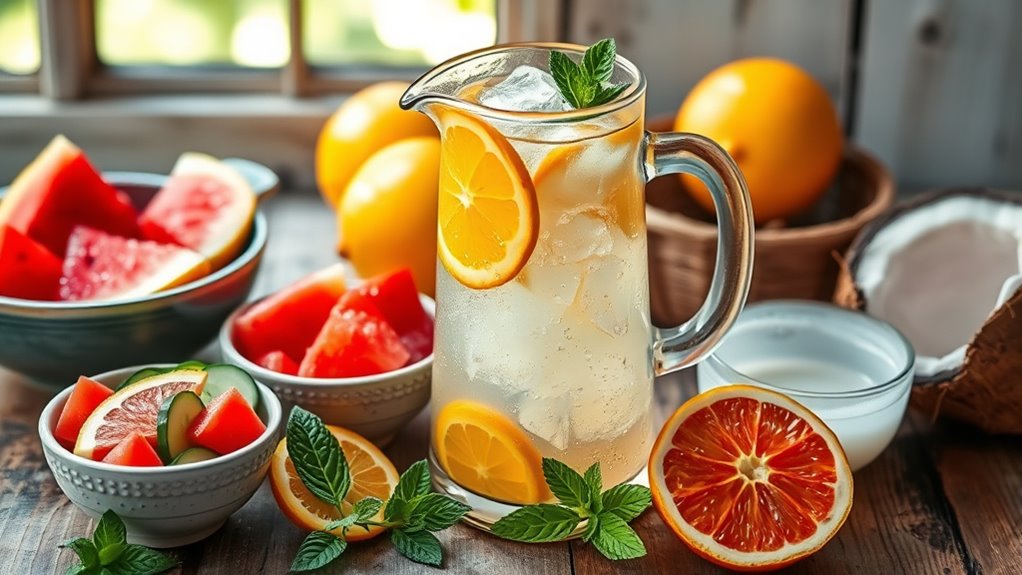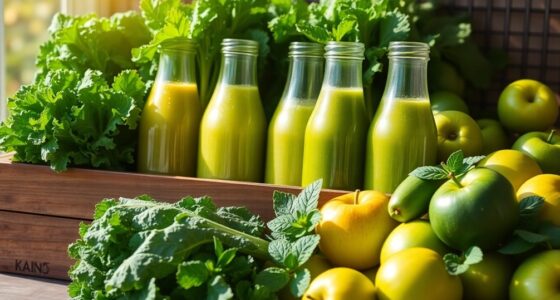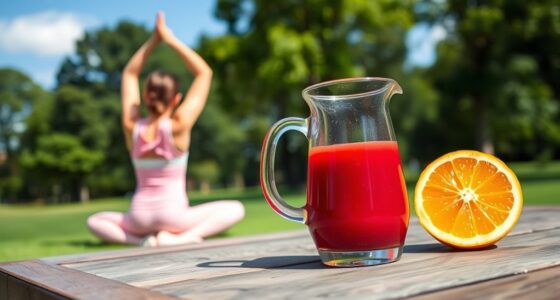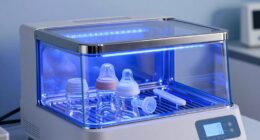During juice week, staying hydrated and maintaining electrolyte balance is key to feeling energized and avoiding dehydration. Besides drinking plenty of water, incorporate electrolyte-rich drinks like coconut water or add a pinch of sea salt to your water. Spread your fluids throughout the day and listen to your body’s thirst cues. Proper hydration helps support your detox process and keeps you comfortable. Learn more tips to optimize your hydration and electrolyte intake as you continue your juice journey.
Key Takeaways
- Incorporate electrolyte-rich drinks like coconut water, lemon water with sea salt, alongside juices to maintain mineral balance.
- Drink small, frequent sips of water and electrolyte solutions throughout the day to prevent dehydration.
- Monitor urine color and thirst levels to ensure proper hydration during juice fasting.
- Increase electrolyte intake during physical activity or outdoor exposure to replace sweat losses.
- Balance natural juices with electrolyte-enhanced water to sustain hydration and prevent mineral depletion.
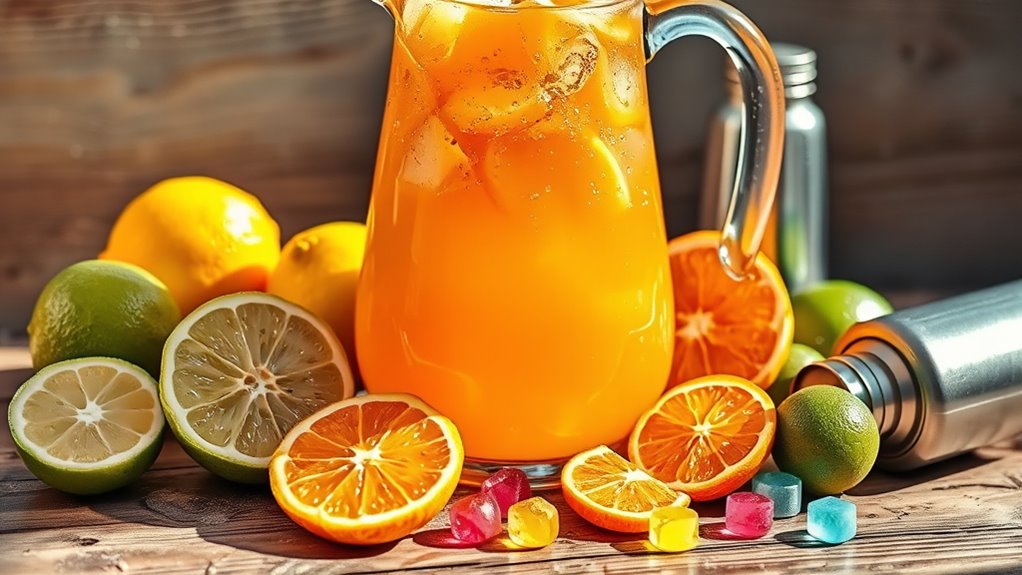
Have you ever wondered why staying hydrated is so important for your body? When you’re doing a juice week, maintaining proper hydration becomes even more essential. Your body relies on a delicate balance of electrolytes—sodium, potassium, calcium, and magnesium—to keep everything running smoothly. These minerals help regulate nerve function, muscle contractions, and fluid balance. If your electrolyte balance gets disrupted, you might experience fatigue, muscle cramps, dizziness, or even more serious issues. That’s why understanding hydration strategies is key during this period.
Staying hydrated during a juice week is vital for maintaining electrolyte balance and overall health.
First, it’s imperative to consume enough fluids that not only quench your thirst but also replenish lost electrolytes. Drinking pure water is great, but during a juice week, incorporating electrolyte-rich drinks or adding a pinch of sea salt to your water can help maintain that essential balance. Electrolyte-enhanced beverages or homemade electrolyte drinks made with natural ingredients like coconut water, lemon juice, and a touch of sea salt are excellent options. These help your body absorb and retain fluids more effectively, preventing dehydration and ensuring your cells function properly.
Another hydration strategy involves listening to your body’s signals. Thirst is a clear indicator, but also pay attention to the color of your urine—pale yellow usually signals good hydration, while darker urine indicates you need more fluids. Regularly sipping on your electrolyte-infused drinks throughout the day prevents dips in hydration levels. Don’t wait until you feel parched; proactive hydration keeps your energy steady and your electrolytes balanced.
It’s also wise to spread out your fluid intake rather than gulping large amounts at once. Small, frequent sips are easier on your stomach and help sustain hydration levels longer. During a juice week, the natural sugars in fruit and vegetable juices contribute to your fluid intake, but they can sometimes be dehydrating if consumed in excess. Balancing your juices with electrolyte-enhanced water ensures you’re not just hydrating but also maintaining the right electrolyte levels.
Finally, consider your activity level. If you’re active or spending time outdoors, your body loses more electrolytes through sweat. In these situations, hydration strategies should include increased electrolyte intake—think of adding a pinch of salt to your drinks or choosing electrolyte supplements. Maintaining electrolyte balance isn’t just about drinking enough fluids; it’s about choosing the right ones and timing your intake properly. Being aware of how to store essential oils and keep them potent can also be part of a comprehensive health and wellness routine. With mindful hydration strategies, you’ll support your body’s needs, keeping you energized, healthy, and well-hydrated throughout your juice week.
Frequently Asked Questions
Can Juice Alone Fully Replace Water Intake for Hydration?
Juice alone can’t fully replace water for hydration because its composition often contains sugars and lacks sufficient electrolytes. While juice provides fluids and some nutrients, it may disrupt your hydration balance if consumed exclusively. You need plain water to maintain ideal hydration, especially during a juice week, to ensure your body stays properly balanced and functions smoothly. So, don’t rely solely on juice for hydration—water remains essential.
How Do Electrolytes Affect Energy Levels During Juice Fasting?
Electrolyte balance plays a vital role in maintaining your energy levels during a juice fast. When your electrolytes are in sync, you experience fewer energy fluctuations and feel more alert. Imbalances, however, can lead to fatigue, weakness, or dizziness. To keep your energy stable, make certain your juice includes natural electrolytes like potassium, magnesium, and sodium, or supplement if necessary. Proper electrolyte management helps you stay energized and avoid unnecessary dips in your vitality.
Are There Specific Signs of Electrolyte Imbalance to Watch For?
You should watch for signs like muscle cramps and heart palpitations, which indicate electrolyte imbalance. If you experience these symptoms, it’s a sign your electrolytes may be low, and you might need to replenish them. Staying attentive to your body helps prevent serious issues. Make certain you’re drinking enough fluids and consider adding electrolyte-rich drinks or foods when necessary. Always listen to your body and seek medical advice if symptoms persist.
Does Juice Consumption Impact Electrolyte Levels Differently Than Water?
Juice consumption impacts electrolyte levels differently than water because juices contain natural electrolytes like potassium and magnesium, aiding electrolyte absorption. However, their pH balance can vary, potentially affecting your body’s acid-base levels. Unlike water, which hydrates without altering pH substantially, juices might influence your electrolyte balance more actively due to their nutrient content. Be mindful of juice types and quantities to maintain proper hydration and electrolyte stability.
Can Excessive Juice Intake Lead to Overhydration or Electrolyte Issues?
Yes, excessive juice intake can cause a juice overload, leading to overhydration and electrolyte imbalance. Drinking too much juice floods your system with sugars and fluids, which may dilute electrolytes like sodium and potassium. This imbalance can result in symptoms like dizziness, cramping, or nausea. To avoid these issues, balance your juice consumption with water and electrolytes, and listen to your body’s signals for thirst and fullness.
Conclusion
By the end of your juice week, you’ll have mastered the art of balancing hydration and electrolytes—like a symphony where each note plays in harmony. Staying properly hydrated keeps your body running smoothly, while maintaining electrolytes guarantees your energy doesn’t fade like a fading sunset. Remember, your body’s a finely tuned machine; treat it with care, and it’ll reward you with renewed vitality. Keep this rhythm steady, and you’ll feel as refreshed as a cool breeze on a hot day.
Cindy thoroughly researches juicing trends, techniques, and recipes to provide readers with practical advice and inspiration. Her writing style is accessible, engaging, and designed to make complex concepts easy to understand. Cindy’s dedication to promoting the advantages of juicing shines through her work, empowering readers to make positive changes in their lives through the simple act of juicing.

